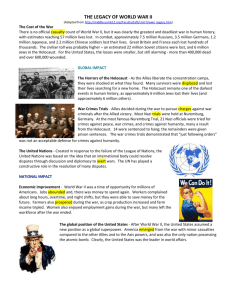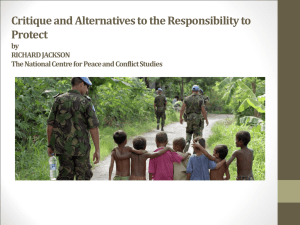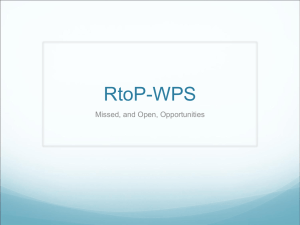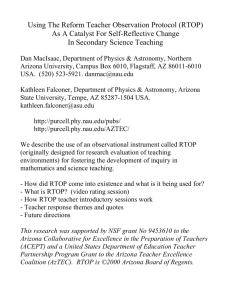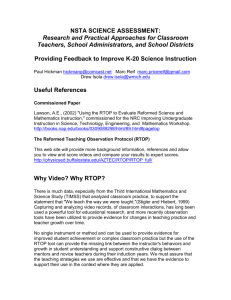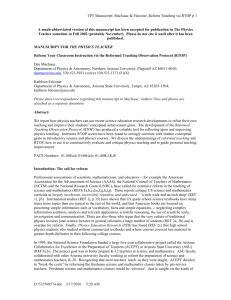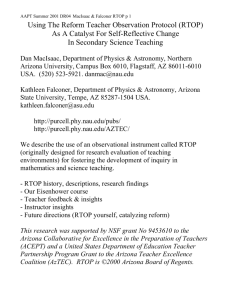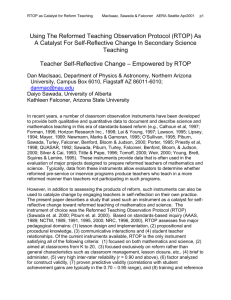ICRtoP - International Coalition for the Responsibility to Protect
advertisement
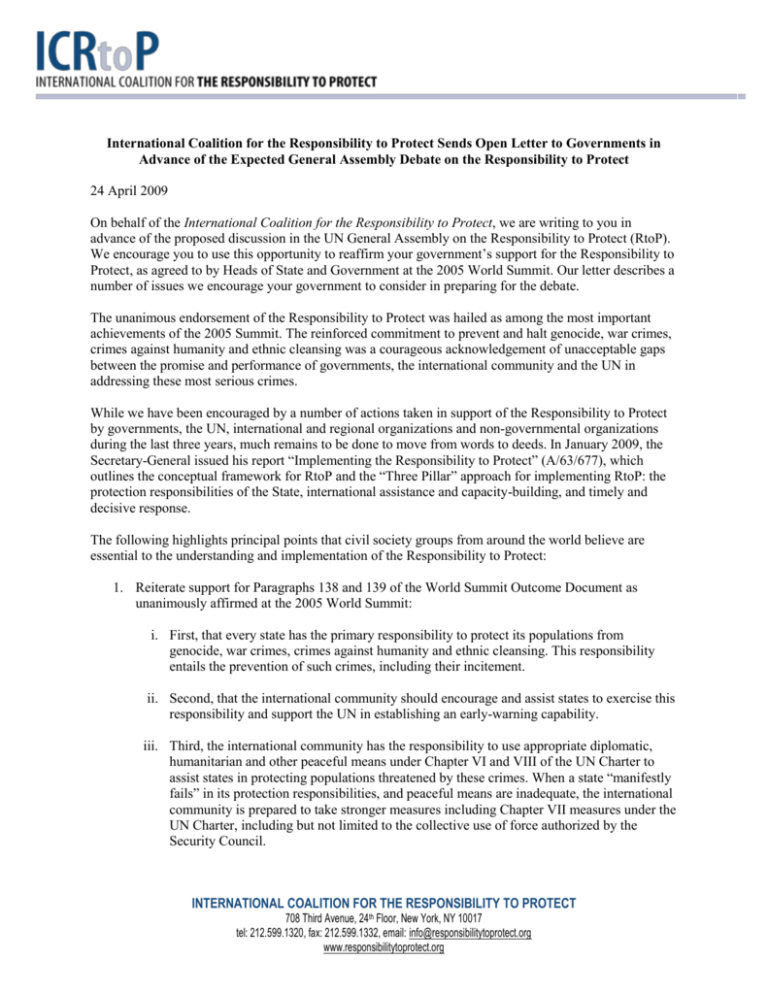
International Coalition for the Responsibility to Protect Sends Open Letter to Governments in Advance of the Expected General Assembly Debate on the Responsibility to Protect 24 April 2009 On behalf of the International Coalition for the Responsibility to Protect, we are writing to you in advance of the proposed discussion in the UN General Assembly on the Responsibility to Protect (RtoP). We encourage you to use this opportunity to reaffirm your government’s support for the Responsibility to Protect, as agreed to by Heads of State and Government at the 2005 World Summit. Our letter describes a number of issues we encourage your government to consider in preparing for the debate. The unanimous endorsement of the Responsibility to Protect was hailed as among the most important achievements of the 2005 Summit. The reinforced commitment to prevent and halt genocide, war crimes, crimes against humanity and ethnic cleansing was a courageous acknowledgement of unacceptable gaps between the promise and performance of governments, the international community and the UN in addressing these most serious crimes. While we have been encouraged by a number of actions taken in support of the Responsibility to Protect by governments, the UN, international and regional organizations and non-governmental organizations during the last three years, much remains to be done to move from words to deeds. In January 2009, the Secretary-General issued his report “Implementing the Responsibility to Protect” (A/63/677), which outlines the conceptual framework for RtoP and the “Three Pillar” approach for implementing RtoP: the protection responsibilities of the State, international assistance and capacity-building, and timely and decisive response. The following highlights principal points that civil society groups from around the world believe are essential to the understanding and implementation of the Responsibility to Protect: 1. Reiterate support for Paragraphs 138 and 139 of the World Summit Outcome Document as unanimously affirmed at the 2005 World Summit: i. First, that every state has the primary responsibility to protect its populations from genocide, war crimes, crimes against humanity and ethnic cleansing. This responsibility entails the prevention of such crimes, including their incitement. ii. Second, that the international community should encourage and assist states to exercise this responsibility and support the UN in establishing an early-warning capability. iii. Third, the international community has the responsibility to use appropriate diplomatic, humanitarian and other peaceful means under Chapter VI and VIII of the UN Charter to assist states in protecting populations threatened by these crimes. When a state “manifestly fails” in its protection responsibilities, and peaceful means are inadequate, the international community is prepared to take stronger measures including Chapter VII measures under the UN Charter, including but not limited to the collective use of force authorized by the Security Council. INTERNATIONAL COALITION FOR THE RESPONSIBILITY TO PROTECT 708 Third Avenue, 24th Floor, New York, NY 10017 tel: 212.599.1320, fax: 212.599.1332, email: info@responsibilitytoprotect.org www.responsibilitytoprotect.org 2. Reaffirm that RtoP applies specifically to genocide, war crimes, ethnic cleansing and crimes against humanity. 3. Recognize that RtoP is derived from the positive notion of ‘sovereignty as responsibility’. The concept does not undermine but enhances sovereignty by acknowledging that governments have existing humanitarian, human rights and other obligations under international law to protect populations from grave crimes. 4. Recall that RtoP principles are global and reinforce pre-existing values and norms from all regions and legal systems. The Secretary General’s report underlines how the African Union adopted strong provisions for the prevention and halting of these crimes, notably in article 4(h) of the African Union Constitutive Act of 2000. 5. Stress that the “appropriate and necessary” response under an RtoP framework includes a wide range of prevention and protection measures (economic, political, diplomatic, legal) available to Member States, the UN, regional and sub-regional organizations and civil society. RtoP is not a synonymous with humanitarian intervention nor does it permit unilateral military intervention. 6. Affirm that prevention is a critical component of RtoP. However, when prevention fails, the international community should ensure an early and flexible response, without sequential or graduated measures. Emphasize that the 2005 World Summit Outcome specifies that collective action to use force be taken through the Security Council in accordance with Chapter VII of the UN Charter 7. Articulate support for the “Three Pillar” approach, as outlined in the Secretary General’s July 2008 Berlin speech and the January 2009 report. The approach emphasizes pillars of equal length, strength and viability and that there is no set sequence to be followed from one pillar to another. 8. Elaborate how your government intends to adopt national, regional and international capacities and policies critical to the implementation of RtoP. Using the “Three Pillar” approach, we urge your government to consider how it intends: i. To fulfill its primary obligation of protecting populations from genocide, war crimes, ethnic cleansing and crimes against humanity. ii. To assist other States in building capacity to protect their populations iii. To commit to taking timely and decisive action to prevent and halt genocide, ethnic cleansing, war crimes and crimes against humanity, through peaceful means as appropriate but also collective coercive measures when peaceful means are inadequate and the State is ‘manifestly failing’ to protect its populations. 9. The International Coalition for the Responsibility to Protect believes that the General Assembly session, in reaffirming paragraphs 138 and 139 of the World Summit Outcome Document, should not reopen debate on the 2005 commitment, but instead should focus on how the General Assembly will perform its oversight of the implementation of RtoP. The UN General Assembly continues to make a critically important contribution to progress in the pursuit of international peace and security. We believe that the overriding purpose of the Responsibility to Protect is to save populations from the most heinous of humanitarian and human rights violations: genocide, war INTERNATIONAL COALITION FOR THE RESPONSIBILITY TO PROTECT 708 Third Avenue, 24th Floor, New York, NY 10017 tel: 212.599.1320, fax: 212.599.1332, email: info@responsibilitytoprotect.org www.responsibilitytoprotect.org 2 crimes, ethnic cleansing and crimes against humanity. The 60th General Assembly adopted a new tool for peace in endorsing the Responsibility to Protect; we hope the 63rd General Assembly will put this tool into operation to achieve the first preambular goals of the UN Charter. Sincerely, Thelma Ekiyor Chair of the International Coalition for the Responsibility to Protect Executive Director of the West Africa Civil Society Institute (WACSI) ICRtoP Steering Committee: Coordinadora Regional de Investigaciones Económicas y Sociales (CRIES) (Argentina) East Africa Law Society (Tanzania) Human Rights Watch Initiatives for International Dialogue (Philippines) International Refugee Rights Initiative (New York and Uganda) Oxfam International West Africa Civil Society Institute (WACSI) World Federalist Movement-Institute for Global Policy INTERNATIONAL COALITION FOR THE RESPONSIBILITY TO PROTECT 708 Third Avenue, 24th Floor, New York, NY 10017 tel: 212.599.1320, fax: 212.599.1332, email: info@responsibilitytoprotect.org www.responsibilitytoprotect.org 3

